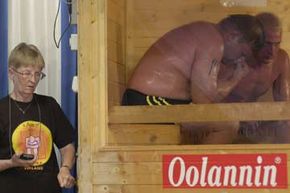Saunas and Your Skin
Let's forget about toxins for a bit and focus on what else is going on with the human body in the sauna. At the very least, the act of sweating cleans the skin, opens the pores and keeps it pliant.
A 2008 study in the journal Dermatology suggested that regular sauna usage has a protective effect on skin functions and may help with dry skin conditions [source: Kowatsiki et al.]. Of course, it's also important to wipe the sweat from skin following a sauna session, in addition to implementing other skin care practices, such as the exfoliation.
Advertisement
Some sauna cultures also include the use of mild self-flagellation. In Russian saunas called banyas, participants lightly flog their skin with a venik, a small bundle of dried, leafy branches of birch, oak, maple or other plants. This sensation helps to increase blood flow, coats the skin in aromatic plant oils and, like most grooming sensations, stimulates the production of opiate endorphins and dampens nervous system pathways to produce mildly narcotic effects [source: Smith].
In the heat of the sauna, the inner body also carries out another important function. The capillaries dilate, causing increased blood flow to the skin. You may have observed this in the rosy hue of your fellow steam bathers. The heart beats faster to regulate this increased circulation, all without an increase in blood pressure. These conditions create an artificial fever condition in the body. Remember, a fever is the body's response to infection, increasing metabolism, lymphatic drainage and white blood cell count. Outer skin temperature may rise by up to 18 degrees Fahrenheit (10 degrees Celsius), while inner temperatures increase up to 5.4 degrees Fahrenheit (3 degrees Celsius) [source: Aaland].
These changes are not always beneficial, however, especially to individuals with weakened constitutions. For this reason, many doctors advise small children and the elderly to avoid saunas -- especially if followed with a system-shocking leap into a cool swimming pool or a bank of snow (both popular after-sauna exercises). Individuals with heart conditions or high blood pressure are also advised to skip the sauna.
The dry heat of a sauna can also open up clogged respiratory passages, but individuals with pneumonia or other acute respiratory diseases generally are advised to avoid sweat bathing. Likewise, saunas can greatly alleviate menstrual cramps and various soft tissue, muscle and joint pains, but the increased heat can introduce increased risks for pregnant women.
